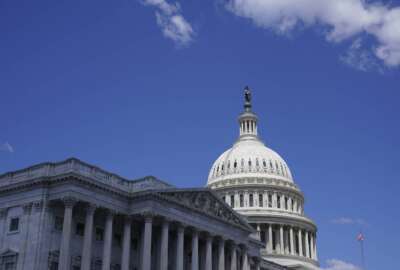Trump’s second term agenda to include cutting ‘slackers’ from federal workforce, former OMB official says
Donald Trump has promised to bring back Schedule F, which would exclude thousands of federal employees in policymaking positions from civil service protections.
Less than a week from Inauguration Day, President-elect Donald Trump is making promises to reshape federal agencies and policies for federal employees.
Among his campaign promises, Trump has promised to make it easier to fire portions of the federal workforce and roll back government regulations. He’s also created a Department of Government Efficiency to recommend cuts to federal spending.
Peter Warren, associate director of the Office of Management and Budget under the first Trump administration, now a senior advisor to House Oversight and Government Reform Committee Chairman James Comer (R-Ky.), said Congress and the incoming administration are focused on opportunities to reorganize the federal government.
Trump, during his first term in office, proposed merging the Office of Personnel Management into the General Services Administration, as well as privatizing the Postal Service. More recently, Trump said he’s revisiting plans to privatize USPS and proposed eliminating the Education Department.
Warren said the presidents for most of the 20th century used their authority to make major changes to the structure of the federal government, and that the Trump administration plans to “revive” that authority.
“We think this administration should have the opportunity to make recommendations about how to change the way the government and its agencies and offices and programs are structured, and that Congress should have to vote on it, and that would be a good thing,” he said Monday at a conference on federal government performance hosted by the National Academy of Public Administration.
Among his campaign promises, Trump has promised to bring back Schedule F, a new designation for thousands of federal employees in policymaking positions that would exclude them from civil service protections.
Warren said the first Trump administration created Schedule F “basically looking at current law and how can greater accountability be instilled under current law.”
Initial estimates found roughly 50,000 federal employees would be impacted by Schedule F, although federal employee unions say there’s evidence of a “far higher” impact on the federal workforce.
Warren said Schedule F would give the incoming administration the tools it needs to deal with underperforming federal employees, or those trying to undermine its policy goals.
“Even though there’s always going to be federal employees who are rockstars, public employees, they’re not angels. They’re not devils, but they’re not angels. They’re human, like the rest of us,” Warren said. “The reality is that with the sort of tenure that federal employees operate under, the incentive system there tolerates a good deal of work-shirking, absenteeism, misconduct. And frankly, it does make it quite feasible to use the power of one’s position to promote an agenda apart from that of the elected president and his appointees.”
Warren said members of the Senior Executive Service would be unaffected by the return of Schedule F because they fall under a different part of the U.S. Code than the rest of the federal workforce.
“There’s always this assumption that everyone’s going to get fired,” he said.
State employees in Texas and Georgia, Warren added, serve as at-will hires and Utah recently made all state government supervisors at-will employees.
“If you look at the only evidence that’s out there, as far as I know anyway, there wasn’t a tidal wave of firings. I think maybe there was an uptick in the dismissal rates, which you would expect, because it’s easier to dismiss people who should be dismissed. But there wasn’t a sea change,” he said.
Warren said Schedule F’s return would make it easier for agencies to fire poor-performing employees and those accused of serious misconduct.
Data from the Federal Employee Viewpoint Survey, he added, shows federal employees feel poor performers and those accused of misconduct at their agencies are not disciplined, and that federal managers are “reluctant they are to take disciplinary action.”
“Nobody wants to spend months of their lives trying to successfully discipline one employee and then potentially have it overturned on a procedural technicality or something by the MSPB,” Warren said.
According to the 2024 FEVS results, 88% of survey respondents said their supervisors hold them accountable for achieving results, and 87% said they are held accountable for the quality of work they produce.
“Anyone who lives here in D.C. knows the federal government tolerates far too many slackers and those who engage in misconduct,” Warren said. “Any federal employee you talk to would complain about how, ‘Oh yeah, this guy to the right and left of me and all over the place, they’re completely useless,’ and had war stories about things that they had done or not done and that they got away with. I don’t think the outgoing administration was the least bit bothered by that.”
Federal employee unions and good-government groups recently paid tribute to former President Jimmy Carter as the first president in modern history to oversee a major overhaul of the civil service system, but said more reforms are needed, nearly 50 years later.
Warren said the Carter administration “had very laudable and ambitious aims in the Civil Service Reform Act,” including shifting the federal workforce to more of a pay-for-performance model, as well as stricter accountability measures for federal employees.
“It seems like one thing that people do agree on generally is that vision has not really come to fruition,” he said.
Warren said lawmakers are interested in a more pay-per-performance system but are “reluctant to endorse higher pay and bonuses without any greater accountability.”
“There’s this boogeyman out there that if anything is done to instill greater accountability, then we’re going to end up returning to the spoils system. But we’ve had a system where there are all these procedural protections and a lot of court rulings that came along with that provide this very strong, essentially, tenure for federal employees,” he added.
Phillip Howard, chairman of Common Good, a nonpartisan, nonprofit organization that advocates for simplifying government, served as one of the chief evaluators of the merit-based pay reforms of the Civil Service Reform Act.
Howard said the time has come for Congress and the White House to revisit the topic of civil service reform.
“Discipline is a serious problem, and Trump has exploited that by proposing Schedule F,” Howard said.
Creating a more accountable federal workforce, he added, would be a “magnet for good people to come into government because they can make a difference,” but warned excessive measures could just as easily drive qualified candidates away.
“It’s really important, I think, to have a mechanism that not only protects against punitive firings or discipline, but also provides cover for officials when they make hard decisions, because there’s no decision that won’t offend someone. So what’s an official supposed to do? The safe thing to do is to always say no and to put it off,” Howard said.
Copyright © 2025 Federal News Network. All rights reserved. This website is not intended for users located within the European Economic Area.
Jory Heckman is a reporter at Federal News Network covering U.S. Postal Service, IRS, big data and technology issues.
Follow @jheckmanWFED






